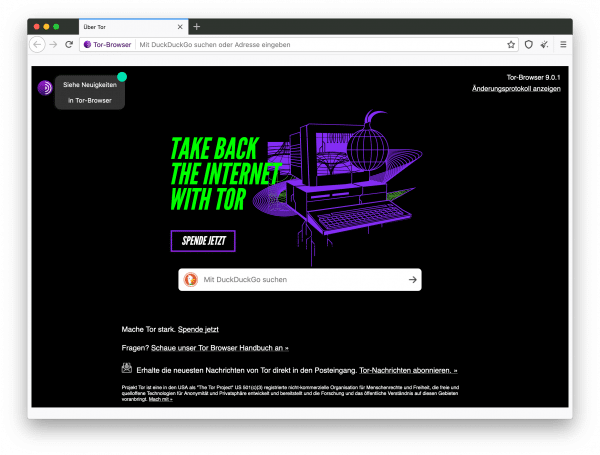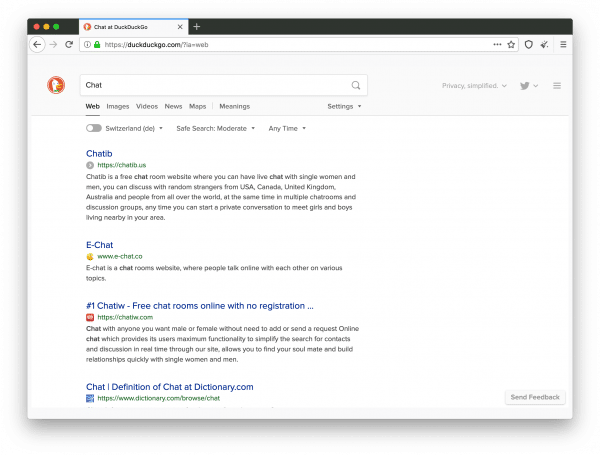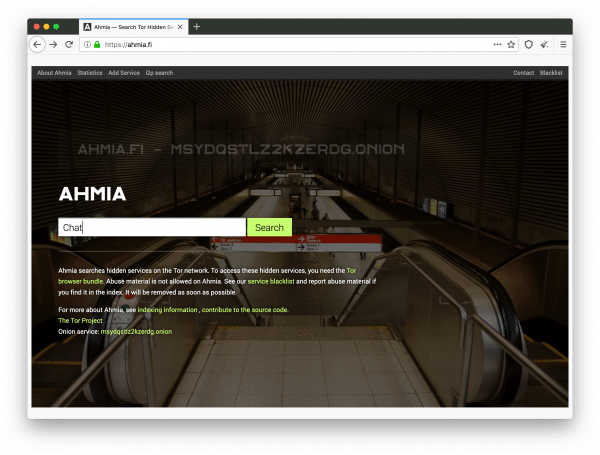Perhaps one or the other still remembers the Internet as it was before Google: If you didn't know the URL of a website or content, it was relatively difficult to find it. Although there were link lists and the first search engines such as Yahoo and Fireball, they were hardly comparable in terms of performance with today's search aces Google, Bing and DuckDuckGo. They rummage through the Internet fully automatically and at high speed, which means that everything can be found with their help. Quite the opposite of before: It was difficult to find content on the Internet if you didn't know exactly what you were looking for.
Find websites on the darknet
The situation in the Darknet is similar to that in the "old" Internet: There is a lot of content, but it has to be found first. One problem with this is that the Darknet can only be accessed via the Tor browser. In addition, unlike in the "normal" web in the Tor browser Darknet, there are no "speaking" domain names due to the lack of central administrative offices such as DENIC or IANA. Content is hidden under cryptic .onion addresses, which also change again and again. For example, the “Hidden Wiki” is the standard entry page for the Darknet, but its .onion URL can only be accessed quickly by memory artists: http://zqktlwiuavvvqqt4ybvgvi7tyo4hjl5xgfuvpdf6otjiycgwqbym2qad.onion
Are there darknet search engines?
If you don't know cryptic URLs of this kind, you will hardly get a foot on the floor in the Darknet. In addition to the hidden wiki in the Darknet itself, there are many websites that offer you Darknet links via "normal" websites, but of course that is not really convenient. What is missing is a search engine like Google. Only: Google and Bing are not active here and the search engine DuckDuckGo, which is offered as the homepage in the Tor browser, also only shows links from the official web. However, the Darknet has been around for so long that some resourceful software developers have come up with search engines for the Darknet comparable to Google.
 The Tor browser initially offers DuckDuckGo ...
The Tor browser initially offers DuckDuckGo ...  ... however, this machine only searches the "normal" Internet.
... however, this machine only searches the "normal" Internet. Fast darknet start with Ahmia
The search engine Ahmia is currently the most powerful darknet search engine: it can be reached on the regular web at www.ahmia.fi, and it also displays its own .onion address on the home page ( http://msydqstlz2kzerdg.onion/ ). However, if you call Ahmia directly with the Tor browser, this is not required at all, because Ahmia only shows Darknet pages as search results. You can click on them as you are used to from Google and Co. and after a forwarding warning you are on the appropriate Darknet page. However, it makes sense to first call up the darknet version of Ahmia in the Tor browser before entering your search: This way you are anonymous to Ahmia! Although Ahmia claims that he does not log any IP addresses; however, since the operator is located in Finland, the regular ahmia.fi website is subject to European legislation and the servers can in theory be compromised by new legislation or law enforcement measures. Therefore, we strongly recommend that you do your first search Go to http://msydqstlz2kzerdg.onion/ instead of ahmia.fi. In addition to Ahmia, there are a few other darknet search engines, but their hit quality is significantly lower than that of Ahmia. In addition to the classic Torch ( http://xmh57jrzrnw6insl.onion/ ), which is also optically very similar to Google, there is also the OnionLand Search ( http://3bbad7fauom4d6sgppalyqddsqbf5u5p56b5k5uk2zxsy3d6ey2jobad.onion/ ). Like Ahmia, it even has a "normal" URL: https://onionlandsearchengine.com ..
 It is therefore advisable to switch to alternatives such as Ahmia.
It is therefore advisable to switch to alternatives such as Ahmia. Searching the Darknet: Why Are There So Few Search Engines?
However, all search engines have the problem that many results are "dead" and the pages behind the search results can often no longer be called up. There is a simple reason for this: search engine crawlers have a hard time on the darknet. On the one hand, because the cryptic .onion addresses are no more than hash values that are reassigned when the Darknet server is set up again. On the other hand, because many sites often intentionally change the .onion address to outsmart potential persecutors. The new URL is then only known to an initiated circle. In addition: Due to this behavior of many pages, it is of course pointless to link pages to one another, since the links "die off" very quickly: Internet search engines such as Google use exactly such links to find, index and weight content.This is also the reason why even a well-functioning darknet search engine like Ahmia has a hard time preparing the results in a meaningful way.
Darknet search engines: attention, legal vacancy!
If a darknet search engine works - like Ahmia is currently - then it spits out results that match search queries, similar to Google. This can be anything from chats to hidden service providers to highly illegal goods that can be purchased on the Darknet. Basically, you should be aware that the Tor browser protects against tracking of Internet activity, but precisely for that reason it does not protect against rip-offs, data theft or fraud! On the contrary: The Darknet defies any state control, which is why the same rules apply here as on any black market: Payment is made in cash - in this case Bitcoin - and there is no guarantee that the goods purchased will be delivered as promised. Of course, this does not only apply to offline purchases, but of course also to services that are offered in abundance on the Darknet. Anyone who moves here should always keep in mind that they are moving in an obscure, legal-free area - and behave accordingly..